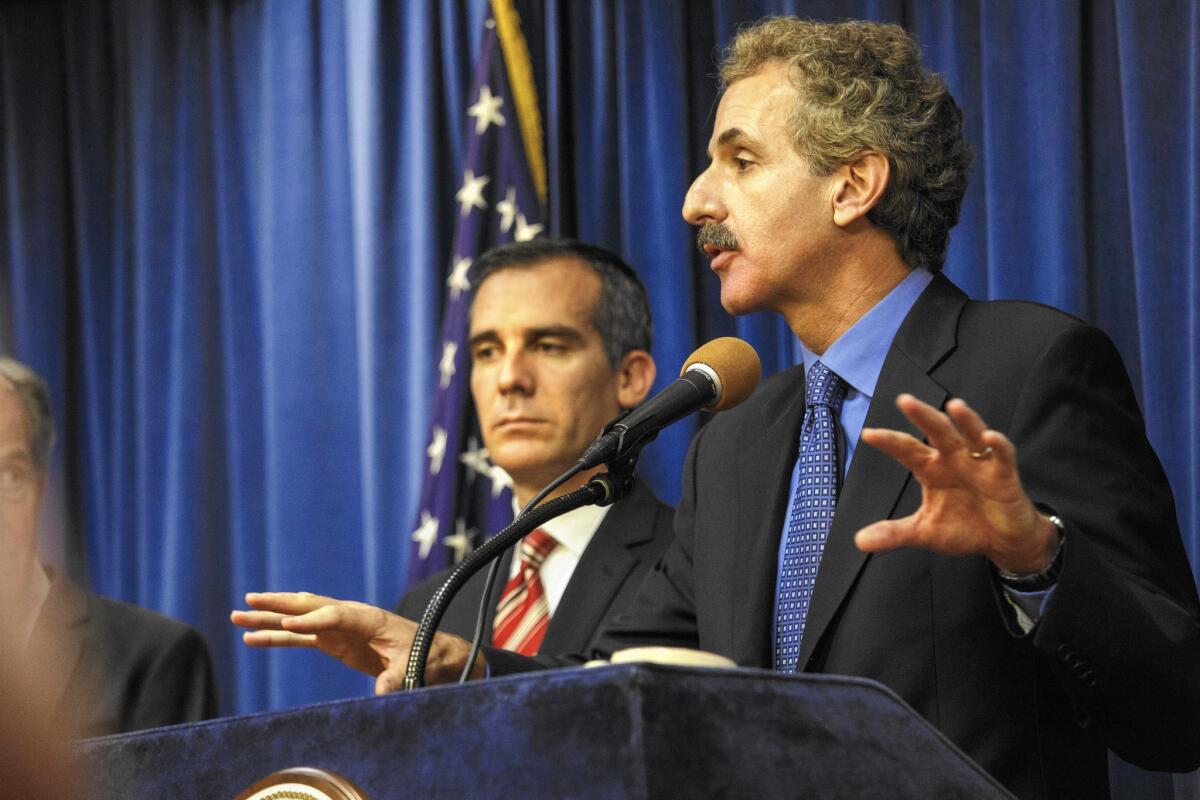City Atty. Mike Feuer, turf rebate recipient, steers clear of DWP records lawsuit

L.A. City Atty. Mike Feuer has “walled himself off” from his office’s deliberations over a DWP lawsuit seeking to prevent the release of names and addresses of those who received turf rebates from the MWD. Feuer received a rebate.
- Share via
The Los Angeles Department of Water and Power has spent months fighting to keep certain information about its turf removal rebate program from being released, arguing in court that customers’ names and addresses should remain confidential.
If the utility ultimately prevails, one of the beneficiaries of its legal battle could be City Atty. Mike Feuer, who received a lawn removal rebate from the DWP in 2014.
Feuer’s legal team has been advising the five-member DWP board on its public records lawsuit, which was filed to prevent the names and addresses of thousands of rebate recipients in Los Angeles from being released to the San Diego-Union Tribune, a sister publication of the Los Angeles Times.
But because he obtained a rebate, the city attorney has “walled himself off” from those deliberations, said Feuer spokesman Rob Wilcox.
Kelly Aviles, an attorney for the Union-Tribune, contends Feuer should have divulged his situation from the outset. Feuer’s status as a rebate recipient, Aviles said, raises questions about whether the entire city attorney’s office also had a conflict — and should have turned to an outside firm to handle the case.
“That was the only way to ensure that the advice that the city received about filing his lawsuit was not tainted by personal interests,” she said.
Wilcox said Feuer bowed out of the DWP deliberations out of “an abundance of caution” in July 2015, when he learned that the utility was pursuing a lawsuit against the Metropolitan Water District, the agency that received the Union-Tribune’s records request. The district distributed lawn removal funds to the DWP and various other water agencies.
In an email, Wilcox said there was no need to turn the DWP case over to an outside firm. “Lawyers, including public lawyers, wall themselves off of litigation without disqualifying the law office,” he said.
Feuer estimated his rebate was around $3,000, Wilcox said.
The DWP case is the latest instance of lawyers at City Hall moving to recuse themselves from political issues. Three years ago, Feuer removed himself from a lawsuit involving the city’s collection of hotel taxes. He did so because he worked a decade ago for a law firm that represented Travelocity, a defendant in the case, Wilcox said.
That same year, the in-house lawyer for Mayor Eric Garcetti formally recused himself from his office’s handling of ride-sharing companies Uber and Lyft. The attorney, Rich Llewellyn, did so because his husband worked for a law firm that represents Lyft.
See more of our top stories on Facebook >>
The Political Reform Act requires that public officials, including city attorneys, “publicly identify” financial interests that result in a conflict. But experts say Feuer’s issue at the DWP does not meet the definition of a financial conflict, which would trigger such a notification requirement.
Attorneys with the Union-Tribune and its parent company, Tribune Publishing, contend there’s a strong public interest in learning how government agencies across Southern California spent hundreds of millions of dollars on turf removal. Without the names, street addresses and amounts of each rebate, the public loses the ability to verify how that money was allocated, they say.
Lawyers for the DWP, in documents that prominently feature Feuer’s name, say the water district has a responsibility to withhold information that would compromise a customer’s privacy or personal safety. The utility has repeatedly cited the 1989 murder of actress Rebecca Schaeffer, who was killed by an obsessed fan who obtained her home address from a private detective, who purchased it from the Department of Motor Vehicles.
------------
FOR THE RECORD
1:48 p.m.: An earlier version of this article said actress Rebecca Schaeffer was killed in 1988. It was 1989.
------------
L.A. County Superior Court Judge James Chalfant sided with the Union-Tribune last month, saying the public interest in disclosing the turf rebate information “clearly outweighs” the case for keeping it confidential. But the two sides continue to debate the particulars of how the information will be released. The parties will meet again Feb. 25 to discuss the proposed judgment.
Meanwhile, Feuer’s wife — L.A. County Superior Court Judge Gail Ruderman Feuer — has indicated through an intermediary that she and three other local judges may intervene in the DWP lawsuit to prevent the Union-Tribune from publishing their home addresses without a court’s explicit approval.
Frederick Bennett, an attorney who represents the L.A. County Superior Court, warned last week that the safety of Feuer and other judges would be compromised if their addresses were published. Bennett wants the Union-Tribune to agree that it will not publish the addresses of the four judges unless it obtains permission to do so from a judge.
If the newspaper does not make that concession, the state’s Judicial Council — the governing body for California’s court system — will probably intervene in the DWP case on behalf of Feuer and other judges, Bennett said. “I’m just trying to minimize the risk that they’re going to expose somebody to a real risk of harm,” he said.
Aviles said none of the Union-Tribune’s rebate articles published so far, using information provided by the Metropolitan Water District from other parts of Southern California, have featured customer addresses. The Times has also refrained from using street addresses of rebate recipients.
Aviles said she is considering Bennett’s request, but does not believe there is a legal basis for granting any exemptions. However, she added that it is difficult to decide whether to agree to withhold certain addresses when the number of officials asking for an exemption is unclear.
Gail Ruderman Feuer served as a high-level attorney for the Natural Resources Defense Council, a prominent environmental organization, before becoming a judge in 2005. In recent years, her husband has backed legislation to keep judges’ personal information confidential.
In 2012, Feuer — then serving in the state Assembly — drafted a bill to allow the home addresses of judges and law enforcement officers to be redacted from public property records. The measure stalled in the state Senate over concerns that its provisions could be abused.
The Police Protective League, the union that represents rank-and-file police officers, backed that bill. In recent weeks, the league has begun issuing warnings about the release of the DWP’s turf rebate information, saying it does not want officers’ home addresses published on the Internet.
[email protected] | Twitter: @davidzahniser
[email protected] | Twitter: @taygoldenstein
Times staff writer Emily Alpert Reyes contributed to this report.
ALSO
A Bay Area battle over a proposed Warriors move from Oakland to San Francisco
Column: How California can entice young people back to teaching
Arrests in 1989 El Salvador priest massacre elicit shock, happiness — and a hope for justice
More to Read
Sign up for Essential California
The most important California stories and recommendations in your inbox every morning.
You may occasionally receive promotional content from the Los Angeles Times.












